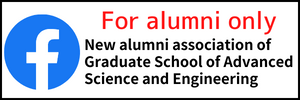Goals and Objectives
While considering the social background and problems in the conventional education course of Hiroshima University, the Division of Advanced Science and Engineering aims not only to provide and cultivate knowledge and skills in students’ own specialized fields but also to develop capabilities for integrated understanding of other fields of science and engineering, and for contribution to local and international societies. Specifically, the Graduate School educates students to obtain the following capabilities:
- Advanced and high-level knowledge and specialized skills in areas of science, engineering, and information science (expertise);
- The ability to understand other areas and application capabilities, practical skills, and the ability to identify problems in integrating and coordinating different areas (cross-disciplinary ability);
- The ability to contribute to realize a sustainable international society in which various culture and religions are equally respected and coexist peacefully against the background of the globalization (internationalism);
- The ability to organize a team of specialists of various academic areas as required and take an action for solving a social problem as a member or the leader of the team while considering the relation between the academic field and the actual society (practical skills for social implementation).
To achieve the aim, the Division of Advanced Science and Engineering provides education and research activities in an advanced method in which the social needs are taken into consideration from cross-disciplinary points of view that is established beyond the border of the graduate schools and major courses as well as the conventional education for improving capabilities in each specialized area to contribute to solve social problems.
Human Resource Development Goals
Master’s Course
The Division of Advanced Science and Engineering provides education to develop not only knowledge and skills in the specialized areas but also ability and characteristics related to international perspective, interdisciplinary ability, and practical skills for social implementation. We develop human resources who are capable of solving social problems while being based on integrated understandings of various scientific areas with the core of sophisticated expertise in the research fields of and those related to science, engineering, information science, and as well as wide and deep intelligence.
Doctoral Course
The Division of Advanced Science and Engineering provides education to develop ability and characteristics related to international perspective, interdisciplinary ability, and practical skills for social implementation as well as knowledge and skills in the specialized areas. We develop human resources who are capable of working for promotion of academic researches and innovation at a world level as a leader in the next generation while being based on integrated understandings of various scientific areas with the core of sophisticated expertise in the research fields of and those related to science, engineering, information science, and as well as wide and deep intelligence.
3 Policies of Master’s Course
The three policies for Master's Course are defined as follows based on the three policies for Master's Course of Hiroshima University.
(1) Diploma Policy
The Division of Advanced Science and Engineering will award either of the following degrees to students who have acquired the capabilities described below, earned the required credits, conducted research activities under the research guidance, and passed the master's thesis examination and the final examination or the qualifying examination for research in the doctoral course according to the research theme and the specialized area: Master of Science, Master of Engineering, Master of Informatics and Data Science, Master of International Cooperation Studies, and Master of Philosophy.
- Advanced and high-level knowledge and specialized skills in areas of science, engineering, information science or their related/combined area.
- The ability to understand other areas in addition to profound expertise in any of the above-mentioned areas and application capabilities, practical skills, and the capability to identify problems in integrating and coordinating knowledge and skills in different areas.
- The ability to solve social problems through creation of "science for sustainable development" and social implementation of technology while cooperating with specialists of various areas.
- The ability to understand scientific logic and research ethics, the ability to dispatch information towards other academic areas, and the capability for international and cross-disciplinary communication.
(2) Curriculum Policy
To enable students to achieve the targets that are defined in the diploma policy, the Division of Advanced Science and Engineering organizes and executes the education courses according to the following policies:
- Subjects specialized for the program are provided to develop the specialized knowledge and skills required for each diploma program.
- Common subjects for the Graduate School are provided to develop wide and deep intelligence, foster ambition to create "science for sustainable development," cultivate a point of view that encompasses areas of the other graduate schools and specialty, interest in society, and an awareness of problems.
- Students are required to take a class subject of another diploma program to improve their understanding of the other area and cross-disciplinary ability.
- To develop human resources who are superior in practical skills, special exercise subjects are provided.
- To develop a capability to identify and solve problems from a broad point of view, students are engaged in a special research under the guidance of a supervisor and two or more subadvisors that include a faculty of the specialized area other than that of the supervisor.
- To develop the fundamental capabilities required for international research activities, common subjects for the Graduate School (internationalism) are provided.
- To develop the practical skills for social implementation, common subjects for the Graduate School (sociality) are provided.
In the curriculum described above, teaching and learning will be implemented by utilizing active learning, experiential learning and online classes, depending on the delivery methods of each program, such as lectures, practical skill courses and seminars.
In regards to grading, the standards are clearly outlined in the syllabus, and strict grading is conducted. Thesis defenses will be conducted in accordance with the decision criteria for awarding degrees and evaluation standards for degree theses of Graduate School of Advanced Science and Engineering (Master’s Course).
(3) Admission Policy
The Division of Advanced Science and Engineering seeks students who have the following aspirations and motivation and have the basic academic abilities necessary for it:
- An ambition for the promotion of advanced and high-level academic and inter-disciplinary research;
- The will to be engaged in professional occupations such as researchers and engineers in areas related to natural science, engineering, and information science;
- A zeal for establishing the "science for sustainable development" from a multifaceted perspective and for solving regional and international issues by acquiring knowledge and study skills for the academic areas related to natural science, engineering, and information science as well as a wide range of intelligence; and
- Common sense and ethics required for a member of society.
In order to admit such individuals, Graduate School of Advanced Science and Engineering selects applicants through a multifaceted and comprehensive evaluation process based on its own Diploma Policy and Curriculum Policy, using interviews, academic tests, and external examinations.
3 Policies of Doctoral Course
The three policies for Doctoral Course are defined as follows based on the three policies for Doctoral Course of Hiroshima University.
(1) Diploma Policy
The Division of Advanced Science and Engineering will award either of the following degrees to students who have acquired the capabilities described below, earned the required credits, conducted research activities under the research guidance, and passed the doctor's thesis examination and the final examination according to the research theme and the specialized area: Doctor of Philosophy in Science, Doctor of Philosophy in Engineering, Doctor of Philosophy in Informatics and Data Science, Doctor of Philosophy in International Cooperation Studies, and Doctor of Philosophy.
- Advanced and prominent research capabilities and specialized skills in areas of science, engineering, information science or their related/combined area and ability to distribute results of academic activities both at home and abroad.
- Cross-disciplinary point of view and ability for social implementation in addition to profound expertise in any of the above-mentioned areas and capability of identifying and solving problems while integrating and coordinating knowledge and skills in different areas.
- The ability to take a leading role in the activity for solving social problems through creation of "science for sustainable development) and social implementation of technology while cooperating with specialists of various areas.
- The ability to understand scientific logic and noble research ethics, ability to dispatch information towards other academic areas, and an advanced capability for international and cross-disciplinary communication.
(2) Curriculum Policy
To enable students to achieve the targets that are defined in the diploma policy, the Division of Advanced Science and Engineering organizes and executes the education courses according to the following policies:
- Subjects specialized for the program are provided to develop the specialized knowledge and skills required for each diploma program.
- Common subjects for the Graduate School are provided to develop wide and deep intelligence, foster ambition to create "science for sustainable development," cultivate a cross-disciplinary and international point of view, and interest and awareness for society and its problems.
- To develop a capability to identify and solve problems from a broad point of view, students are engaged in a special research under the guidance of a supervisor and two or more subadvisors that include a faculty of the specialized area other than that of the supervisor.
- To develop the practical capabilities required for international research activities, common subjects for the Graduate School (internationalism) are provided.
- To develop an ability to solve social problems, common subjects for the Graduate School (sociality) are provided.
In the curriculum described above, teaching and learning will be implemented by utilizing active learning, experiential learning and online classes, depending on the delivery methods of each program, such as lectures, practical skill courses and seminars.
In regards to grading, the standards are clearly outlined in the syllabus, and strict grading is conducted. Thesis defenses will be conducted in accordance with the decision criteria for awarding degrees and evaluation standards for degree theses of Graduate School of Advanced Science and Engineering (Doctoral Course).
(3) Admission Policy
The Division of Advanced Science and Engineering seeks students who have the following aspirations and motivation and have the basic academic abilities necessary for it:
- An ambition for taking the leading role in advanced and prominent academic and inter-disciplinary research;
- The will to take the leading role in professional occupations such as researchers and engineers in areas related to natural science, engineering, and information science;
- A zeal for establishing the "science for sustainable development" from a multifaceted perspective and for solving regional and international issues by acquiring sophisticated knowledge and study skills for the academic areas related to natural science, engineering, and information science as well as a wide range of intelligence; and
- Common sense as a member of society and ethics required for researchers and highly-professional engineers.
In order to admit such individuals, Graduate School of Advanced Science and Engineering selects applicants through a multifaceted and comprehensive evaluation process based on its own Diploma Policy and Curriculum Policy, using interviews, academic tests, and external examinations.

 Home
Home



